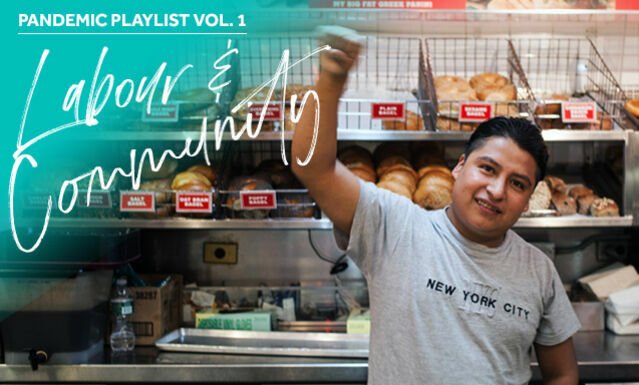In this unprecedented time, where much of the world is under quarantine, many do not have the choice to stay at home and are forced to work under great duress with risk to their lives. The COVID-19 crisis presents a moment for us to reflect on the injustices and inequalities embedded in the capitalist system’s assault on labour. It also presents openings for us to improve working conditions and labour rights for all.
We are launching our first Pandemic Playlist Vol. 1: Labour and Community on Labour Day to draw attention to frontline workers, caregivers, womyn, wage-labourers and the global precariate. Stay tuned and follow CP for more carefully curated, critical and creative Pandemic Playlists of political film* for you to discover (or in some cases rediscover), discuss, share and fold into the fabric of collective resistance and collective care. And now, please take a moment to hear from workers and activists from the Migrant Rights Network.
1. Migrant Dreams (Min Sook Lee, Canada, 2016, 88’)
We lead our first playlist with one of the most important and celebrated labour films to come out of Canada. Migrant Dreams is a brave and bold documentary that tells the relatively untold story of migrant agricultural workers facing conditions created by the draconian Temporary Foreign Worker Program (TFWP). With intimate access and unwavering attention to the politics of labour organizing and solidarity work, this award-winning exposé goes inside secretive meetings, documents crucial community efforts by Justice for Migrant Workers, and foregrounds the insights and experiences of those most impacted by Canada’s abusive TFWP: migrant workers from various countries held hostage or toiling under labour exploitation yet fighting back to win.
As migrant and racialized workers continue to make up much of the agricultural and food industries in Canada, and who continue to work (mostly for low wages) during the pandemic when others are able to stay safely at home and benefit from their labour, we think Migrant Dreams is the perfect May Day work to share.
2. The Hand That Feeds (Rachel Lears & Robin Blotnick, USA, 2014, 84’)
Labour organizing around low-wage economies in the US is an ongoing struggle, made all the more urgent during the COVID-19 pandemic as workers at turbo-profitable companies like Amazon strike and demand better, and crucially, safer working conditions. The Hand That Feeds is an inspiring part of this larger story, as the award-winning and audience favourite doc follows workers at a popular New York city sandwich chain who, as migrants and in some cases undocumented workers, have the most to lose yet take bold, direct actions for better pay and working conditions.
From occupation to picketing to solidarity work, sandwich-maker Mahoma López and mostly Latinx and racialized workers take back their rights in an exhilarating and rousing story of a community’s inspired struggle. Given that Black and Latinx populations are devastatingly, disproportionately impacted by the current pandemic, we felt this riveting film was timely right now.
3. A Right to Eat (Janelle Wookey & Jeremie Wookey, Canada, 2015, 49’)
Food security and health are closely related to labour justice, and communities facing some of the most dire conditions and challenges around access to healthy, affordable food in Canada (and the USA) are Indigenous. In A Right to Eat the directors deftly craft a story of not only food injustice (where a carton of milk can cost $14), but of community renewal. In this moving story of a northern First Nations community, the sparks of traditional care and skill are re-ignited through the self-empowering and collective revitalization of gardening, farming, fishing and hunting.
The COVID-19 pandemic has made food security and justice a more visible issue than ever, and once we are through the crisis we believe, like so many, there is no returning to “normal.” A post-COVID world will have to be more just and more community-based, and with that in mind, the self-sufficiency that comes with growing your own food must be linked to Indigenous sovereignty and the health of the planet.
4. Who’s Counting? Marilyn Waring on Sex, Lies and Global Economics (Terre Nash, Canada, 1995, 94’)
In this feminist classic, Academy-Award winning documentarian Terre Nash focuses her careful and critical lens on economist Marilyn Waring, who relentlessly campaigns for the unpaid and therefore unrecognized work of womyn to be validated and rewarded. Putting forth a vision of time as a kind of currency, and measuring other paid forms of work that are ecologically and socially destructive against the community-building and progressive unpaid work of womyn, Waring charts a path straight to the current crisis.
There has been widespread reporting that womyn are and will take on the brunt of the COVID-19 pandemic, as shelters become inaccessible, as girls return home from shuttered schools, as the majority of household work falls even more intensely on womyn. We feel this current moment of crisis provides for a time of reflection on gender and labour, and Who’s Counting? is a foundational and fierce documentary contribution to discussions around sex and gender equity, especially as it relates to work, and crucially as it relates to exploitation and abuse during times of crisis.
5. What It’s Really Like to Be a Sex Worker & A Feminist Sex Worker Explains What Happens on the Job
Not that we are eager to promote Vice, but we thought the first short video was perfect for this pandemic playlist for three reasons: (1) the labour of sex workers is not only unvalidated, but criminalized in most of the world, (2) sex workers are impacted by the current pandemic and for the most part are unable to make employment claims because their work is deemed illegal; (3) the video portrays sex workers going about their lives in their homes – where many of us are spending an inordinate amount of time during the time of COVID-19.
The Vice short follows photographer Lindsay Irene as she seeks to represent sex workers as, wait for it….regular folks who have jobs and lives and pets and pastimes. There is power in politicizing representation when going against powerful narratives that have brainwashed huge swaths of the population to believe certain occupations make people out to be less-than others. Short little films like this one, and the second, like A Feminist Sex Worker Explains What Happens on the Job, contribute to undoing those harmful lies.
6. Miners Shot Down (Rehad Desai, South Africa, 2014, 86′)
Cinema Politica has shown many films exposing Canada’s legacy of destructive global mining practices. With Miners Shot Down, we share a film from South Africa that zooms in to one labour struggle at one particular mine, and its brutal aftermath. In August 2012, mineworkers in one of South Africa’s biggest platinum mines began a wildcat strike for better wages. Six days later the police used live ammunition to brutally suppress the strike, killing 34 and injuring many more. Following the strike from its first day, Desai’s brave filmmaking reveals exploitation and corruption at high levels.
The massacre that resulted from workers’ demanding their rights and dignity is not particular to this mine or country. It is a reminder that mining is a bloody business, an industry feeding the world’s insatiable appetite for rare earth metals, diamonds, gold, silver and more – “goods” that come with costs that are only hidden if we aren’t looking in the right places, as this powerful documentary does.
7. The World According to Amazon (Thomas Lafarge & Adrien Pinon, France, 2019, 77′)
While we aren’t fans of the punishing TV voice of god narration, we do think The World According to Amazon is a useful info-doc to watch for those looking for inspiration for an Amazon boycott during COVID and beyond. As Amazon’s CEO Jeff Bezos becomes the world’s first trillionaire and Amazon’s profit margins soar thanks to stay-at-home customers ordering everything from ice cream to extension cables, the company that cornered the internet shopping market is set to be even bigger and badder, post-COVID. In this investigative documentary you learn that Amazon really makes its money from its stake in internet security, as its clients like the CIA and Netflix pay the company huge bank to run their back end systems. Amazon has become so too big to fail that you can even watch the film on Amazon Prime – perhaps capitalism will eat its own afterall.
Watch on CBC.
8. Camperforce (Bretty Story, Canada, 2017, 16’)
In stark contrast to the info-rich, investigative style of The World According to Amazon, try an artful antidote that approaches the behemoth from a different angle: Brett Story’s Field of Vision short Camperforce. Named after the parking lot precariate that make up Amazon’s “labor unit” of RVers, who are mostly elderly and retired, the film reflects Story’s cultural geography approach to subject – pensively exploring the workplace through clean geometrically divided mise-en-scène, sharing intimate and quirky interview spaces that give glimpses of a culture, and quietly contemplating the strange and terrifying quotidian of corporate work without the perks (unless you count free RV parking).
9. Machines (Rahul Jain, India-Germany-Finland, 2016, 75’)
Our friends at the world’s largest documentary film festival in Amsterdam, IDFA, have made some of their favourite festival hits available for free streaming during the pandemic. One of those titles also screened with Cinema Politica, and we’d be remiss to not include it on this playlist. Machines is a visceral, poetic and jarring look at workers on the job in Surat in Gujarat province, India – a massive industrial zone that has been developing at breakneck speed since the 1960. Jain’s inquisitive and restless lens explores the relationship of worker to place, worker to machine and worker to the drudgery of industrial work.
Visually breathtaking, Machines left us pondering the nature of work and the toil of “progress.” These seem to be fit topics to ponder at the moment when capitalism has been clawed back, however temporarily, by the COVID-19 pandemic.
** MACHINES is no longer available for streaming online **
Sign up for Cinema Politica’s newsletter to receive updates, including info on our next pandemic playlist, Volume 2: Health and Community Care. Get informed, inspired and most importantly, get involved. * Most titles are free to view, some require payment to stream, and the majority are Cinema Politica works (both distributed and exhibited by CP).



